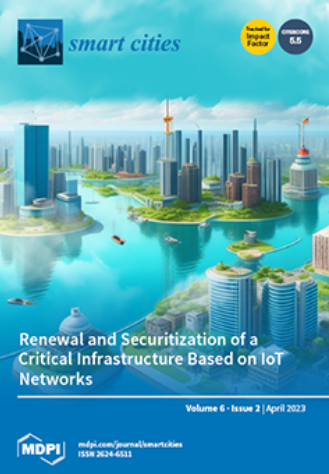Multivariate Time-Series Forecasting: A Review of Deep Learning Methods in Internet of Things Applications to Smart Cities
IF 5.5
Q1 ENGINEERING, ELECTRICAL & ELECTRONIC
引用次数: 0
Abstract
Smart cities are urban areas that utilize digital solutions to enhance the efficiency of conventional networks and services for sustainable growth, optimized resource management, and the well-being of its residents. Today, with the increase in urban populations worldwide, their importance is greater than ever before and, as a result, they are being rapidly developed to meet the varying needs of their inhabitants. The Internet of Things (IoT) lies at the heart of such efforts, as it allows for large amounts of data to be collected and subsequently used in intelligent ways that contribute to smart city goals. Time-series forecasting using deep learning has been a major research focus due to its significance in many real-world applications in key sectors, such as medicine, climate, retail, finance, and more. This review focuses on describing the most prominent deep learning time-series forecasting methods and their application to six smart city domains, and more specifically, on problems of a multivariate nature, where more than one IoT time series is involved.多元时间序列预测:深度学习方法在智慧城市物联网中的应用综述
智慧城市是指利用数字解决方案提高传统网络和服务效率的城市地区,以实现可持续增长、优化资源管理和居民福祉。今天,随着世界各地城市人口的增加,它们的重要性比以往任何时候都更大,因此,它们正在迅速发展,以满足其居民的各种需要。物联网(IoT)是这些努力的核心,因为它允许收集大量数据并随后以智能方式使用,从而有助于实现智慧城市目标。使用深度学习的时间序列预测一直是一个主要的研究焦点,因为它在许多关键领域的实际应用中具有重要意义,例如医学、气候、零售、金融等。这篇综述的重点是描述最突出的深度学习时间序列预测方法及其在六个智慧城市领域的应用,更具体地说,是涉及多个物联网时间序列的多变量问题。
本文章由计算机程序翻译,如有差异,请以英文原文为准。
求助全文
约1分钟内获得全文
求助全文
来源期刊

Smart Cities
Multiple-
CiteScore
11.20
自引率
6.20%
发文量
0
审稿时长
11 weeks
期刊介绍:
Smart Cities (ISSN 2624-6511) provides an advanced forum for the dissemination of information on the science and technology of smart cities, publishing reviews, regular research papers (articles) and communications in all areas of research concerning smart cities. Our aim is to encourage scientists to publish their experimental and theoretical results in as much detail as possible, with no restriction on the maximum length of the papers published so that all experimental results can be reproduced.
 求助内容:
求助内容: 应助结果提醒方式:
应助结果提醒方式:


